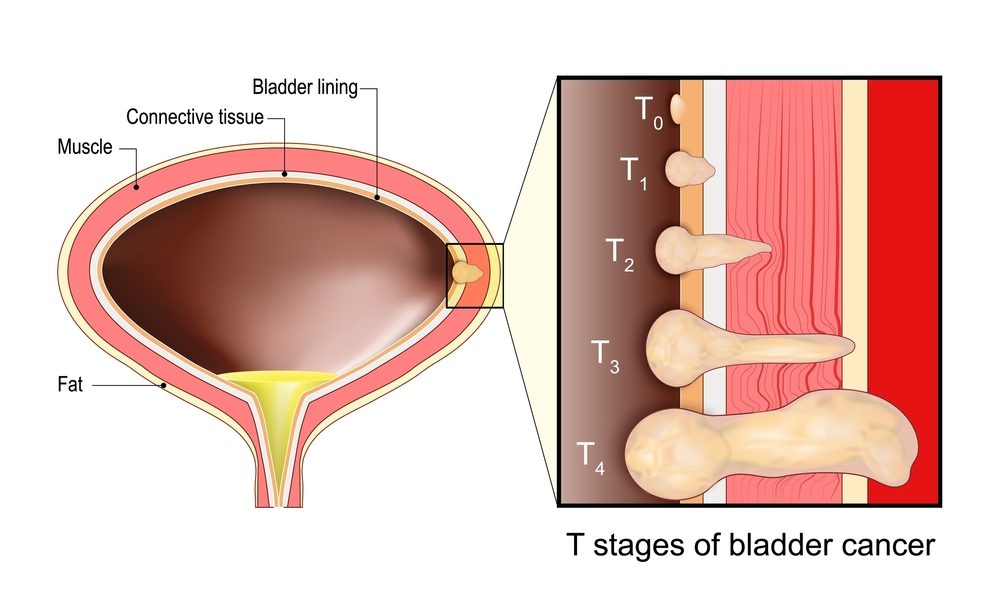Bladder Tumor Treatment in Turkey
Bladder Cancer Surgery at Vitale Hospital


What is Bladder Cancer?
Bladder cancer is a type of cancer that originates in the bladder, the organ responsible for storing urine before it exits the body. Most bladder cancers begin in the cells lining the inside of the bladder (urothelial cells) and can grow and spread to other parts of the body if untreated. Bladder cancer can range from low-grade (less aggressive and unlikely to spread) to high-grade (more aggressive and likely to invade other tissues).
Table of Contents
ToggleBladder cancer is treatable, especially when detected early, and Turkey has become a sought-after destination for bladder cancer surgery due to its advanced facilities, skilled specialists, and competitive pricing. Treatments are tailored to the type and stage of the tumor, providing patients with effective and personalized care.
What are the Symptoms of Bladder Cancer?
Bladder cancer symptoms can vary depending on the stage and severity of the disease, and they may often resemble other urinary tract issues. Here are the most common signs and symptoms:
- Blood in the Urine (Hematuria): Blood in the urine is one of the earliest and most common symptoms of bladder cancer. It may appear pink, red, or dark brown and may be intermittent.
- Frequent or Painful Urination: Bladder cancer can cause a persistent urge to urinate, even when the bladder is not full, and may lead to discomfort or a burning sensation during urination.
- Pelvic or Back Pain: In later stages, bladder cancer may cause pain in the pelvic area, lower back, or abdomen, especially if the cancer has spread beyond the bladder.
Early-stage bladder cancer may not cause noticeable symptoms, making regular check-ups and early screening essential, especially for individuals at higher risk.
What Causes Bladder Cancer?
The exact cause of bladder cancer is not always clear, but several risk factors can increase the likelihood of developing the condition. Here are some common causes and risk factors associated with bladder cancer:
- Smoking: Smoking is a leading cause of bladder cancer, as harmful chemicals in tobacco accumulate in the urine, damaging the cells lining the bladder.
- Chemical Exposure: Certain industrial chemicals, such as those used in dye production, rubber, and paint, can increase the risk of bladder cancer.
- Chronic Infections and Inflammation: Chronic bladder infections or long-term use of catheters may lead to chronic inflammation, raising the risk of bladder cancer.
- Age and Gender: Bladder cancer is more common in older adults and is found more frequently in men than women.
Understanding these risk factors can aid in preventive measures and encourage early diagnosis, especially for those with high exposure to carcinogens.
How is Bladder Cancer Diagnosed?
Diagnosing bladder cancer involves several tests and procedures to confirm the presence of cancer cells and determine the stage of the disease. Here’s an overview of the diagnostic process:
Urine tests are used to detect blood, abnormal cells, or specific markers associated with bladder cancer. A urine cytology test can reveal cancerous cells.
During a cystoscopy, a thin tube with a camera is inserted into the bladder through the urethra. This allows the doctor to examine the bladder lining for abnormalities or growths.
Imaging tests, such as a CT urogram, MRI, or ultrasound, provide detailed images of the bladder and surrounding areas, helping to identify any tumors or irregularities.
If a suspicious area is found, a small tissue sample (biopsy) may be taken and analyzed to confirm the presence of cancer cells and determine the type and grade of the tumor.
Bladder Tumor Treatment Options in Turkey
Bladder tumor treatment options in Turkey include a variety of methods, each tailored to the type, stage, and location of the tumor. Turkey’s healthcare system provides high-quality treatment options, often at more affordable costs compared to other countries. Here are the main treatments available:
Pre- and Post-Treatment Care for Bladder Tumor Treatment in Turkey
Before Treatment:
- Comprehensive Consultation: Patients meet with specialists to discuss treatment options, review their medical history, and assess overall health to determine the most effective approach.
- Preparation for Surgery: For patients undergoing surgery, certain pre-surgical tests may be required, such as blood tests, imaging, and possibly adjustments to medications.
- Dietary Adjustments: Patients may be advised to follow dietary recommendations, particularly if undergoing chemotherapy or immunotherapy.
After Treatment:
- Regular Monitoring: Follow-up appointments are essential to monitor recovery, check for recurrence, and assess overall health. Imaging and urine tests may be conducted periodically.
- Physical and Emotional Support: Recovery from bladder cancer treatment may involve physical and emotional challenges, so supportive care and counseling are often recommended.
- Lifestyle Adjustments: Patients are encouraged to maintain a healthy lifestyle, avoid smoking, and stay hydrated to support bladder health and reduce the risk of recurrence.
Doctors
Op. Dr. Kemal BULUT
Urology Specialist

Cost of Bladder Tumor Treatment in Turkey
The cost of bladder tumor treatment in Turkey depends on the type of treatment and the specialist’s experience. Turkey is known for its advanced healthcare facilities and competitive prices, making it a popular choice for patients seeking quality care.
- Initial consultations and diagnostic tests
- Surgical procedures or other treatments (e.g., TURBT, cystectomy, chemotherapy)
- Post-treatment follow-up care and monitoring
With high-quality treatment at affordable rates, Turkey offers international patients access to world-class care for bladder cancer.
FAQ
The best treatments for bladder cancer depend on the stage and type of cancer, with options including transurethral resection (TURBT) for early-stage tumors, cystectomy for more advanced cases, and intravesical therapy to target cancer within the bladder. Systemic chemotherapy and radiation may also be used, especially if the cancer has spread beyond the bladder.
Recovery time depends on the procedure type, but most patients recover from TURBT within a week. More extensive surgeries, such as cystectomy, require longer recovery periods and may involve lifestyle adjustments.
Yes, Turkey is known for providing advanced medical treatments at competitive prices, making bladder cancer treatment affordable for international patients. Many clinics offer comprehensive packages covering all aspects of the treatment.
Yes, varicocele can often be cured permanently through surgical intervention, such as a varicocelectomy, which cuts off blood flow to the affected veins. With successful surgery, recurrence rates are low, and many patients experience lasting relief from symptoms and improved fertility.


